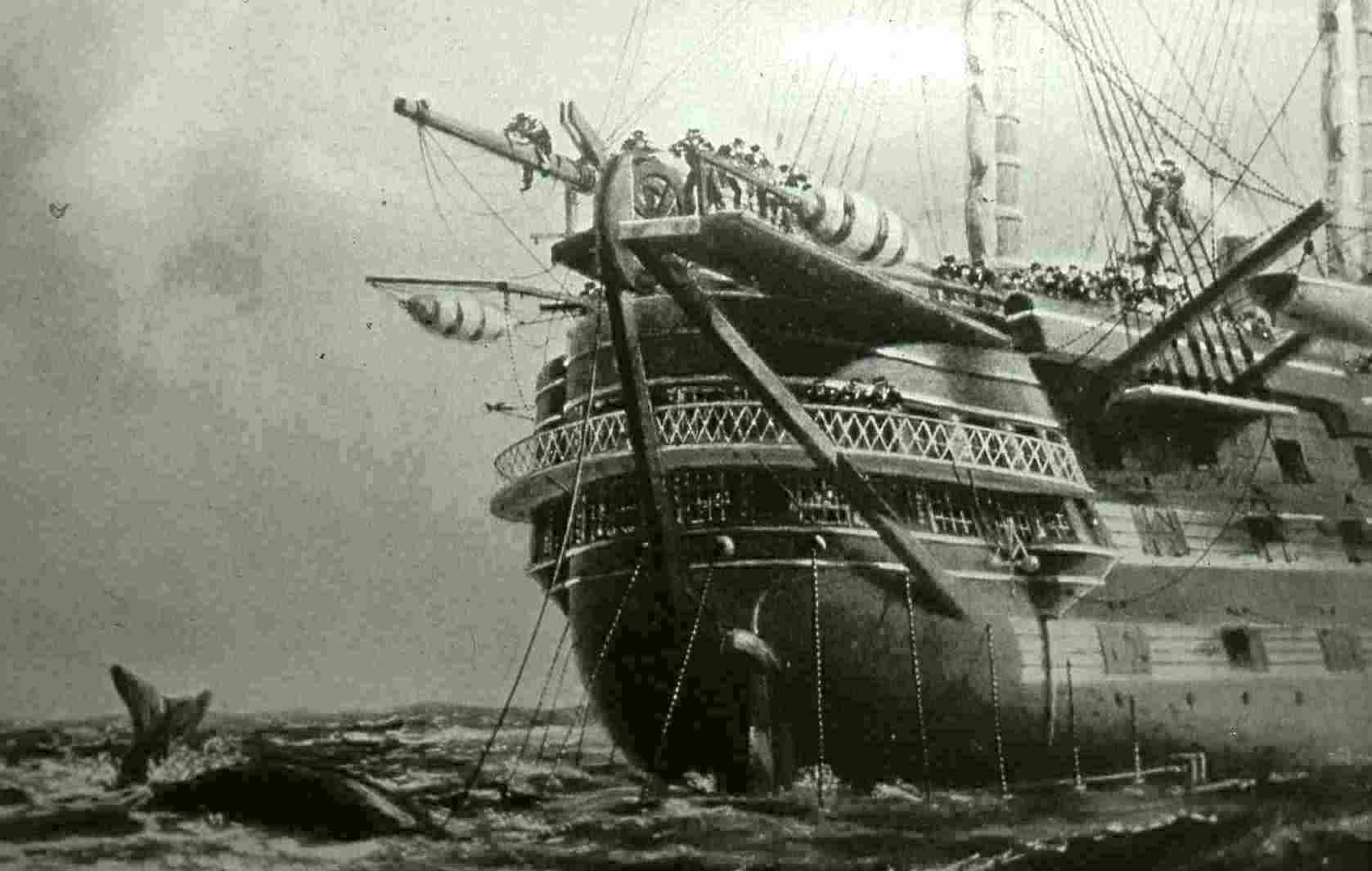Philosophy
 After exploring the birth of the scientific revolution as it took place in England, and tracing the consequences of that revolution as they manifested in and helped fuel the industrial revolution, today's episode of this fascinating documentary series explores the men behind some of the greatest scientific breakthroughs of the 19th century.
After exploring the birth of the scientific revolution as it took place in England, and tracing the consequences of that revolution as they manifested in and helped fuel the industrial revolution, today's episode of this fascinating documentary series explores the men behind some of the greatest scientific breakthroughs of the 19th century.
First up is the all-too-likable Michael Faraday, that man of humble origins who would rise to scientific fame through his ingenuity and the precision and creativity of his experiments, especially those he conducted on electromagnetism. Without his contributions, the world would be literally dark at night, so he's kind of a big deal.
 Richard Dawkins recounts the story of a great neglected hero of his: Alfred Russel Wallace, the man who thought up the theory of evolution through natural selection independently of Darwin, and who would consequently stimulate the latter to finally publish all the work he'd kept secret for about twenty years. Like Faraday, Wallace also turned out to be a super nice guy... unlike that other British dick embroiled in a priority dispute over the invention of the calculus: Newton :)
Richard Dawkins recounts the story of a great neglected hero of his: Alfred Russel Wallace, the man who thought up the theory of evolution through natural selection independently of Darwin, and who would consequently stimulate the latter to finally publish all the work he'd kept secret for about twenty years. Like Faraday, Wallace also turned out to be a super nice guy... unlike that other British dick embroiled in a priority dispute over the invention of the calculus: Newton :)
 The next two men in our story dreamed of developing faster communication between Europe and America through what would become the Transatlantic cable. William Thomson (mainly famous for his work on thermodynamics) would develop the theory and the engineering required to produce a workable cable, and Isambard Kingdom Brunel would develop the theory of fluid motion that would then allow him to create the ship capable of carrying and laying said cable. Brunel did not live to see his dream realized, but when the mission finally succeeded, Thomson became Lord Kelvin.
The next two men in our story dreamed of developing faster communication between Europe and America through what would become the Transatlantic cable. William Thomson (mainly famous for his work on thermodynamics) would develop the theory and the engineering required to produce a workable cable, and Isambard Kingdom Brunel would develop the theory of fluid motion that would then allow him to create the ship capable of carrying and laying said cable. Brunel did not live to see his dream realized, but when the mission finally succeeded, Thomson became Lord Kelvin.
Finally, Jim Al-Khalili introduces the incredible and curious genius of James Clerk Maxwell, arguably the man whose intellectual contributions were the most important contributing factor for inspiring Einstein to develop his theory of special relativity.
If the book of Genesis had said this:

or even "wash your hands," I'd totally be a believer :)
.
- Laura Snyder - The Philosophical Breakfast Club
When we think about scientists, and especially the birth of science, our minds usually go straight to Galileo, Descartes, Kepler and Newton, and then to folks like Michael Faraday, Joseph Priestly, Antoine Lavoisier, Lord Kelvin, Darwin, etc. Or maybe...
- The Birth Of Calculus - Newton And Leibniz
Before you run away in fear of having seen the word calculus, let me preface this entry by saying that you don't have to understand how it works, or even be able to do it, to understand and appreciate why it's important and why calculus represents...
- What Darwin Never Knew
Darwin's idea of evolution through natural and sexual selection has been dubbed by many as perhaps the greatest single idea anyone has ever come up with. In a remarkable stroke of genius, Chuck was able to bridge the gap between the world of inanimate...
- The Genius Of Britain - Episode 1
The scientific revolution represents one of the most exciting developments of our species' history, replacing the old traditions of dogma, authority, superstition and fear with the promise of true understanding, reason, knowledge and freedom. The...
- Darwin: The Most Revolutionary Scientist Of All Time
150 years ago today, Chuck Darwin published his famous On the Origin of Species, so it's appropriate to dedicate today's entry to the brilliance and imaginative power of this radical intellectual. In the following thought-provoking lecture, Richard...
Philosophy
The Genius of Britain - Episode 3
 After exploring the birth of the scientific revolution as it took place in England, and tracing the consequences of that revolution as they manifested in and helped fuel the industrial revolution, today's episode of this fascinating documentary series explores the men behind some of the greatest scientific breakthroughs of the 19th century.
After exploring the birth of the scientific revolution as it took place in England, and tracing the consequences of that revolution as they manifested in and helped fuel the industrial revolution, today's episode of this fascinating documentary series explores the men behind some of the greatest scientific breakthroughs of the 19th century.First up is the all-too-likable Michael Faraday, that man of humble origins who would rise to scientific fame through his ingenuity and the precision and creativity of his experiments, especially those he conducted on electromagnetism. Without his contributions, the world would be literally dark at night, so he's kind of a big deal.
 Richard Dawkins recounts the story of a great neglected hero of his: Alfred Russel Wallace, the man who thought up the theory of evolution through natural selection independently of Darwin, and who would consequently stimulate the latter to finally publish all the work he'd kept secret for about twenty years. Like Faraday, Wallace also turned out to be a super nice guy... unlike that other British dick embroiled in a priority dispute over the invention of the calculus: Newton :)
Richard Dawkins recounts the story of a great neglected hero of his: Alfred Russel Wallace, the man who thought up the theory of evolution through natural selection independently of Darwin, and who would consequently stimulate the latter to finally publish all the work he'd kept secret for about twenty years. Like Faraday, Wallace also turned out to be a super nice guy... unlike that other British dick embroiled in a priority dispute over the invention of the calculus: Newton :) The next two men in our story dreamed of developing faster communication between Europe and America through what would become the Transatlantic cable. William Thomson (mainly famous for his work on thermodynamics) would develop the theory and the engineering required to produce a workable cable, and Isambard Kingdom Brunel would develop the theory of fluid motion that would then allow him to create the ship capable of carrying and laying said cable. Brunel did not live to see his dream realized, but when the mission finally succeeded, Thomson became Lord Kelvin.
The next two men in our story dreamed of developing faster communication between Europe and America through what would become the Transatlantic cable. William Thomson (mainly famous for his work on thermodynamics) would develop the theory and the engineering required to produce a workable cable, and Isambard Kingdom Brunel would develop the theory of fluid motion that would then allow him to create the ship capable of carrying and laying said cable. Brunel did not live to see his dream realized, but when the mission finally succeeded, Thomson became Lord Kelvin.Finally, Jim Al-Khalili introduces the incredible and curious genius of James Clerk Maxwell, arguably the man whose intellectual contributions were the most important contributing factor for inspiring Einstein to develop his theory of special relativity.
If the book of Genesis had said this:

or even "wash your hands," I'd totally be a believer :)
.
- Laura Snyder - The Philosophical Breakfast Club
When we think about scientists, and especially the birth of science, our minds usually go straight to Galileo, Descartes, Kepler and Newton, and then to folks like Michael Faraday, Joseph Priestly, Antoine Lavoisier, Lord Kelvin, Darwin, etc. Or maybe...
- The Birth Of Calculus - Newton And Leibniz
Before you run away in fear of having seen the word calculus, let me preface this entry by saying that you don't have to understand how it works, or even be able to do it, to understand and appreciate why it's important and why calculus represents...
- What Darwin Never Knew
Darwin's idea of evolution through natural and sexual selection has been dubbed by many as perhaps the greatest single idea anyone has ever come up with. In a remarkable stroke of genius, Chuck was able to bridge the gap between the world of inanimate...
- The Genius Of Britain - Episode 1
The scientific revolution represents one of the most exciting developments of our species' history, replacing the old traditions of dogma, authority, superstition and fear with the promise of true understanding, reason, knowledge and freedom. The...
- Darwin: The Most Revolutionary Scientist Of All Time
150 years ago today, Chuck Darwin published his famous On the Origin of Species, so it's appropriate to dedicate today's entry to the brilliance and imaginative power of this radical intellectual. In the following thought-provoking lecture, Richard...
